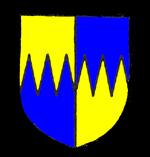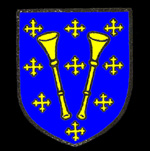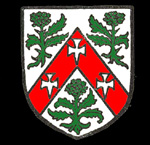The Manor of Perots alias Beeston-Caldecote alias Trumpingtons

The Pirot family coat of arms
Volume III of The Victoria County History for Bedfordshire, published in 1912, gives the histories of all the manors in the parish of Northill as far as they were known at the time. The volume states that this manor was descended from land in Beeston held by Eudo the Steward, alias Eudo, son of Hubert and tenanted by a man named Pirot, who also held a manor from Eudo in Northill itself at the time of the Domesday Book. The manor was held of the Barony of Eaton [Socon] until the 1370s when it passed to the Lords of Groby [Leicestershire].

The Trumpington family coat of arms
The manor was tenanted by Ralph Pirot in the mid 1280s but by 1300 was in the hands of Giles de Trumpington, hence one of the manor's later names. The manor stayed within the Trumpington family until 1457, when Sir Walter gave it to Maud Enderby in trust for her life, as her son, Richard, was pledged to marry his daughter, Eleanor. Richard Enderby succeeded in 1474 and died in 1487. His son John alienated the manor to William Gascoigne and in 1507 Sir Edmund Lucy and his wife Eleanor (Richard Enderby's widow) recovered it for their lives. In 1510 it reverted to Eleanor Enderby, Eleanor Lucy's daughter who married Francis Pigot and their son Thomas conveyed the manor to Henry Everard in 1555.

The Thornton family coat of arms
By 1741 the manor was in the ownership of Samuel Cockayne and Bromsall Throckmorton. By 1801 it was in the hands of Godfrey Thornton of Mogerhanger, who had purchased it from Thomas Smith of GraysInn.
The manor remained in the hands of the Thornton family until a succession of Law of Property Acts in the 1920s abolished manorial fines and incidents as well as copyhold land tenure, thus abolishing manors in practically all but name.